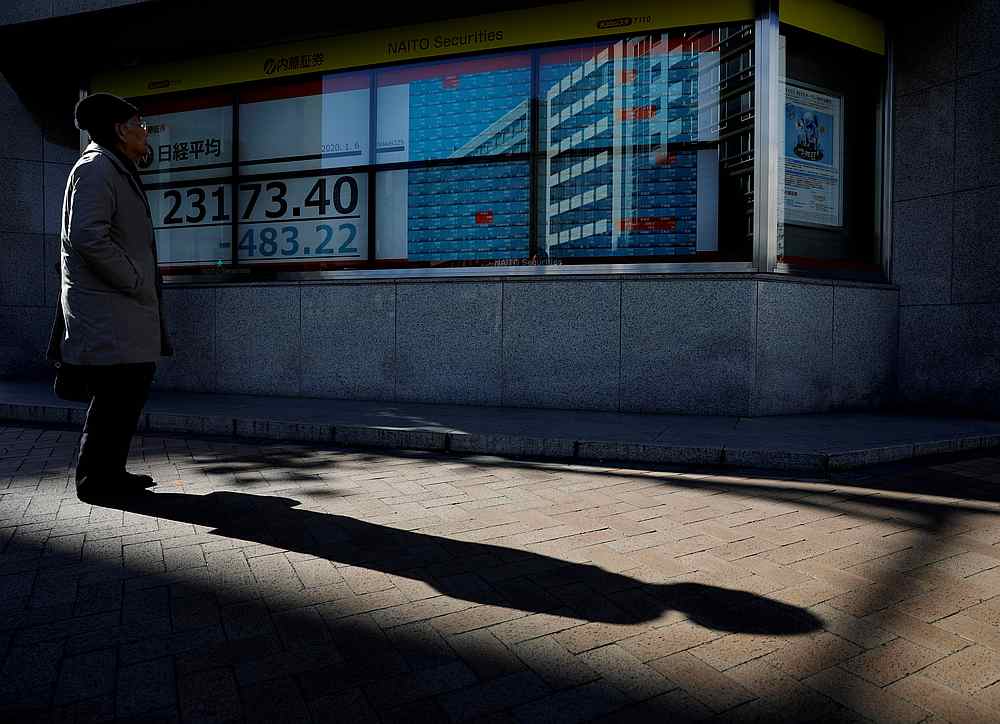SYDNEY, Feb 10 — Stocks and oil fell while safe-haven gold rose today as the death toll from a coronavirus outbreak surpassed the SARS epidemic, raising alarm bells about its severity.
As many as 908 people have so far died in China’s central Hubei province as of yesterday with most of the new deaths in the provincial capital of Wuhan, the epicentre of the outbreak.
MSCI’s broadest index of Asia-Pacific shares outside Japan stumbled 0.7 per cent to be on track for its second straight day of loss. Japan’s Nikkei fell 0.8 per cent while South Korea’s KOSPI was off 1.4 per cent and Australian shares eased 0.5 per cent.
The losses extended from Wall Street on Friday where the Dow fell 0.9 per cent, the S&P 500 declined 0.5 per cent while the Nasdaq dropped 0.5 per cent. E-mini futures for S&P 500 were down 0.3 per cent today.
“Expect markets to be sensitive to virus headlines. In this environment, we favour defensive positioning,” ANZ economists wrote in a note.
“Markets will be sensitive to coronavirus news, as factories and ports in China reopen. The extent to which that is achievable will indicate the level of ongoing disruption,” they added.
As Chinese authorities made plans for millions of people returning to work after an extended Lunar New Year break a large number of workplaces and schools are still likely to remain closed and many white-collar employees will work from home.
Worries about the hit to the world’s second-largest economy has hurt investor risk appetite though confidence in China’s ability to contain the epidemic has prevented sharp losses.
China’s central bank has taken a raft of measures to support the economy, including reducing interest rates and flushing the market with liquidity. From today, it will provide special funds for banks to re-lend to businesses working to combat the virus.
Despite the measures, many of China’s usually teeming cities have almost become ghost towns as authorities ordered virtual lockdowns, cancelled flights, closed factories and shut schools.
On Friday, Singapore raised its coronavirus alert level and reported more cases not linked to previous infections or travel to China.
An advance team of international experts led by the World Health Organisation (WHO) left for Beijing to help investigate the epidemic, the Geneva-based agency said yesterday.
The virus has dominated broader market sentiment with better-than-expected US jobs data on Friday failing to lift sentiment.
Non-farm payrolls increased by 225,000 jobs in January, with employment at construction sites increasing by the most in a year amid milder-than-normal temperatures, the Labor Department said.
Benchmark 10-year US Treasury notes ticked higher to push yields down to 1.5645 per cent.
Euro zone bond yields fell after German industrial output tumbled in December to notch its biggest fall since January 2009, fanning concerns about the bloc’s biggest economy.
The euro held near four-month lows at US$1.0950 (RM4.54).
The dollar slipped against the yen to be on track for a second straight day of losses. It was last at ¥109.61 (RM4.14).
The Australian dollar, considered a liquid proxy for China plays, briefly hit an 11-year low of US$0.6679. It fell 0.2 per cent last week to clock its six straight weekly loss.
That left the dollar index flat at 98.662.
Oil prices slipped as Russia said it would need more time before committing to output cuts along with the Organisation of the Petroleum Exporting Countries and other producers amid falling demand for crude as China battles the coronavirus.
Since January 17, oil prices have fallen by 14 per cent while copper has is down around 10 per cent.
Brent crude futures declined 52 cents to US$53.95 a barrel, while US crude futures slipped 45 cents to US$49.87 a barrel.
US gold futures added 0.3 per cent at US$1,577.5 an ounce. Spot gold was higher at US$1,574.4. — Reuters






















